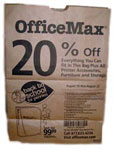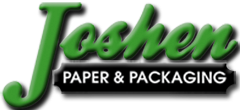Office Max Newspaper bag
Effective Newspaper Advertising
Home>Newspaper Bag Insert Program>Office Max Paper Bag Feature
Leaders Can Learn Something from Advertising -- Honest!
FC Expert Blog
By FC Expert Blogger John Baldoni Tue Mar 2, 2010
This blog is written by a member of our expert blogging community and expresses that expert's views alone.
Two examples of advertising caught my attention recently; both have relevance for leaders.
The first is a television commercial showing a woman taking a shower. Nothing new except the actress in the spot for Dove soap is fully clothed. The message as we learn from the voice over narration is that only Dove has moisturizers to clean skin deeply whereas other soaps only clean the skin’s surface (represented by the clothes). The appeal is logical (moisturizing soap is deep cleaning), rooted in emotion (feel more clean).
 The second example was brown paper shopping bag featuring the
Office Max logo. Whatever would fit into the bag, according to ad
copy, would be discounted by 20%. The shopping bag was part of a Sunday
newspaper insert. The appeal is urgent (buy now), supported by logic
(discounted pricing).
The second example was brown paper shopping bag featuring the
Office Max logo. Whatever would fit into the bag, according to ad
copy, would be discounted by 20%. The shopping bag was part of a Sunday
newspaper insert. The appeal is urgent (buy now), supported by logic
(discounted pricing).
Taken together the two ads depict something that leaders must strive to do whenever they seek to persuade: provide a good reason and add a sense of urgency. This is especially true for middle managers who are challenged to implement corporate initiatives that may seem irrelevant to employees. It falls to managers to provide the reasons why as well as the need to do it now.
For example, senior management will push for a cost-cutting initiative. Too often the reasons are expressed in vague terms like “reduce spending by 10%.” Utilizing reason, the manager will quantify that ten percent as savings in travel, purchasing, and service expenditures. Employing urgency, the manager will position the need to do it now as an exercise in alignment, e.g. everyone do her part to save money now.
Let’s break down reason and urgency into their fundamentals.
Reason is based upon logic, a deductive flow from A to B and so on.
You start the flow of ideas with solid facts. You speak in terms of consequence, that is, what happens next and why. For example, we need to add an engineer to our team because we need someone who enjoys solving problems. With that engineer on board we will be able to our own diagnostics. That will enable us to improve our delivery times as well as our quality ratings.
Urgency is rooted in an impetus for action, the need to do it now.
You want to emphasize the need to move quickly and the importance of acting promptly. An example would be making a case for a new product. Your argument could be rooted in the fact that the competition is working on something similar and you want to capitalize on the first-mover advantage.
Reason and urgency are not mutually exclusive. That is, reason can be compelling and urgency does have consequence. But if you stand back on think about each separately it may give you a handle on structuring a fact-based argument that provides a strong bias for action.
Reason backed by urgency makes for a compelling argument but it should be used with discretion.
For example, if the organization is having a blood drive, some employees simply do not want to participate. The same may apply to corporately sanctioned volunteer activity. Giving blood and volunteering are praiseworthy activities but employees need to determine if and how they would like to participate. While managers may feel compelled to employ the hard sell, such an approach will only backfire. Employees will resent it and tune out the manager.
The ability to persuade others is a chief requirement of effective leadership. The manager who can learn to balance his communications with the proper blend of reason (facts) and urgency (do it now) will be one who can mobilize others to her point of view. And to return to our advertising theme, it is good to recall the words of legendary ad man, William Bernbach who wrote, "Advertising is fundamentally persuasion and persuasion happens to be not a science, but an art.” Just like leadership.
John Baldoni is an internationally recognized leadership development consultant, executive coach, author, and speaker. In 2010 Top Leadership Gurus named John one of the world's top 25 leadership experts. John's newest book is Lead Your Boss: The Subtle Art of Managing Up (Amazon 2009).



